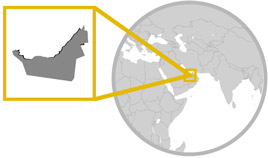Money
Qatar uses the Qatari Riyal (QAR) which can be divided down into 100 Dirham but it has only been using this for the last 50 years and before 1966 it used the Indian Rupee and the Saudi Riyal. At one point it also shared its value with the Dubai Riyal but since 1973 the two are no longer linked.
Qatari Riyal comes in the form of 1, 5, 10, 25 and 50 Dirham coins as well as in 1, 5, 10, 25, 50, 100 and 500 Riyal bank notes. Typically the Qatari Riyal has an exchange rate of QAR 1 to $0.27 or £0.17.
Economy
Making up more than 70% of total revenue in the country, Petroleum is the absolute cornerstone of the Qatari economy. However, natural gas reserves also make up a significant proportion of the Qatari economy with the country owning the third largest natural gas reserves in the world.
Qatar is undeniably the richest country in the world with current GDP per capita growing more than 1,150% during the 70’s, over 50% in the 80’s and over 90% in the 90’s. Prior to the 40’s when the oil and gas fields began being exploited, Qatar was a pearl fishing country and one of the poorest countries in the world.
Experts predict that Qatar’s oil fields will be mostly depleted by 2023 but the natural gas reserves are expected to hold out for significantly longer. The average wage per hour in Qatar is at around QAR 220 (about $60 or £36).
Banking
ATMs are available throughout Doha but in the lesser developed areas of Qatar may not be so available. Banks will typically charge a fee to use another bank’s ATM and both rent and wages are paid via post-dated cheques, among other large bills and cash amounts.
You’ll need a reference letter from your employer which states your salary and their approval for you to open an account, a Passport with copies and often a Residency Permit. Very similarly to the United Arab Emirates, Qatar’s banks generally offer three types of bank account.
The Current Account type is used for everyday banking and typically has no monthly fee as long as around QAR 3000 (about $825 or £500) is maintained in the account’s balance.
The Savings Account type pays out a higher amount of interest but only allow a certain amount of free-withdrawals before a nominal fee is charged, normally a balance of QAR 5000 (about $1,375 or £830) is required to be maintained.
Finally, a Fixed Deposit Account is the other common type which has been optimized for long-term saving and pays out a much higher rate of interest, but requires around QAR 20,000 (about $5,495 or £3,315) to be maintained in the account’s balance.
Taxes
Qatar does not impose any income tax on citizens and only a foreigner owning and operating a business within Qatar needs to pay any tax at all. There is no road tax, car tax, television licence fee, council tax or VAT in Qatar at all but it is rumoured that around five to seven percent VAT may be introduced in the future, although this has yet to be officially confirmed.
However, some statutory fees apply to certain transactions and services, including an import tax on all products brought into the country intended for commercial resale at four-to-five percent of the value of the goods, a service tax on food and drink purchased in hotels at seven percent and a flat corporate tax of ten percent applicable to all profit made by any business owned or partially owned by foreigners in Qatar.

